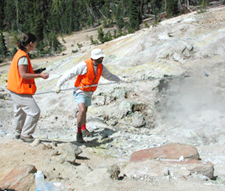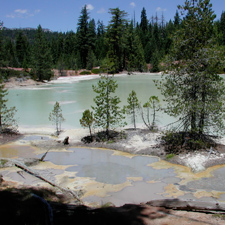The award will fund a five-year collaboration with microbiologists at Portland State University and California State University - Chico to establish a microbial observatory at Boiling Springs Lake, an acidic hydrothermal lake in Lassen that is the largest hot spring in North America.

Scientists will investigate basic ecological questions concerning the abundance, diversity, activities and interactions of microorganisms and viruses in natural habitats. A remotely operated vehicle designed and built by undergraduate engineering students will be used to map the lake's physical structure, and to sample thermally distinct regions of the lake to assess biological and chemical variation at various temporal and spatial scales.
The grant will provide independent scientific research opportunities for approximately 100 undergraduates at the three universities, and will be integrated into classroom research projects that reach hundreds more. The grant also provides funds for yearly research symposia for the investigators, high school, undergraduate, and graduate students, park personnel, and community members. In addition, students will be involved in producing a color brochure for park visitors, highlighting the structure, chemistry, and biology of this unique lake, and giving the public a deeper appreciation of the microbial world.

The study of extremophiles provides insight into the biodiversity and evolution of life on earth, aids in understanding how organisms adapt and thrive in diverse environments and helps identify where and how to search for life on other planets. Extreme environments such as Boiling Springs Lake are ideal for study of microbial ecology because they harbor simple model communities with less organismal diversity than is observed in non-extreme habitats. In addition, the unusual physical and metabolic properties of extremophiles provide novel enzymes and processes for biotechnology applications.
Details of the research project are at: http://www.humboldt.edu/~pls13/LIBARATE/
Contact:
Dr. Patricia Siering, Humboldt State University Biology Department
pls13@humboldt.edu
707-826-3120
Dr. Mark S. Wilson, Humboldt State University Biology Department
msw13@humboldt.edu
707-826-5557